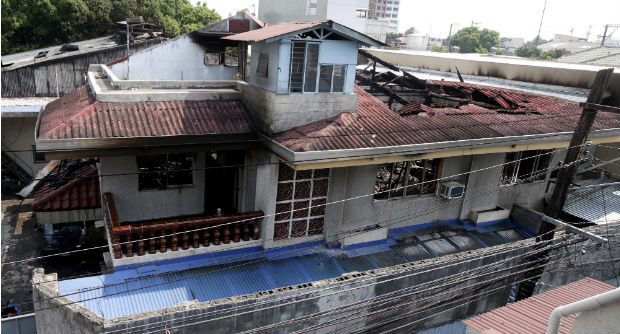Death of 8 workers trapped in fire should be wake-up call for PH—labor group

A gutted remains of a two-storey house remains closed on Friday, May 30, 2014 at suburban Pasay city, south of Manila, Philippines, following a pre-dawn fire that killed eight women who were trapped inside. Police officials have taken into custody the Filipino-Chinese owner of the house who allegedly padlocked the house from the outside while being away on business. AP
MANILA, Philippines – It’s not the first time that workers were killed in a fire after being trapped in a padlocked building. And it might happen again if the government doesn’t move fast, a labor safety organization said.
The Institute for Occupational Health and Safety for Development (Iohsad) claimed that the employer of the eight women who died of suffocation after their warehouse was engulfed in flames last May 30 should be held accountable for violating his workers’ right to safe workplaces.
The employer, a Chinese businessman named Juanito Go, denied accusations that he padlocked the workers in the second floor room of a warehouse along P. Samonte Street, Barangay (village) 47 in Pasay City.
But Iohsaid pointed out that the lack of a fire escape was enough evidence of poor working conditions.
“Reports said that the workers who survived the tragedy escaped through a narrow hole in the building. This is a clear violation of Rule 1943.03 of the Philippine Occupational Health and Standards (OHSS) that outlines the need to have at least 2 exits in every floor and basement capable of clearing the work area in five minutes,” the group said in a statement.
Article continues after this advertisementIohsad Executive Director Noel Colina said the “tragedy confirms our country’s recent inclusion in the International Trade Union Confederation (ITUC) report as one of the worst countries to work in.”
Article continues after this advertisementThe ITUC’s 2014 Global Rights Index, released two weeks ago, gave the Philippines a rate of “5,” joining countries like India, Saudi Arabia, Cambodia and other countries where there is “no guarantee of rights.”
“Countries with the rating of 5 are the worst countries in the world to work in. While the legislation may spell out certain rights workers have effectively no access to these rights and are therefore exposed to autocratic regimes and unfair labor practices,” ITUC explained.
“More and more workers are forced to work in unsafe and inhumane conditions. In the case of the eight workers, they had to endure working and staying in a padlocked warehouse that eventually caused their precious lives,” Colina said.
He pointed out that in May 9, 2012, 18 female workers of Novo Jeans and Shirts Department Store in Butuan City also died after being trapped in a burning building.
“We reiterate our call to the government to criminalize occupational health and safety violations to protect the workers and make companies liable for work-related deaths,” Colina said.
RELATED STORIES
8 trapped women die in Pasay fire